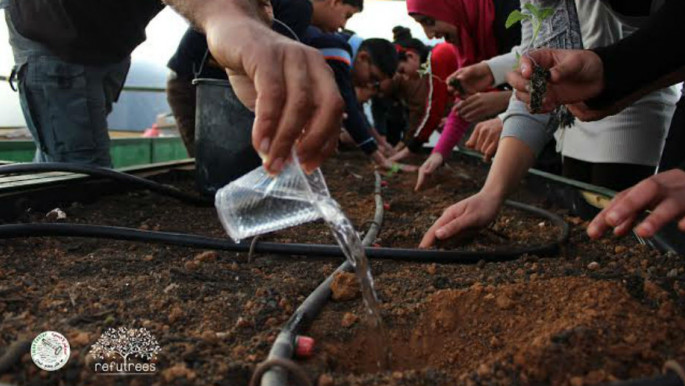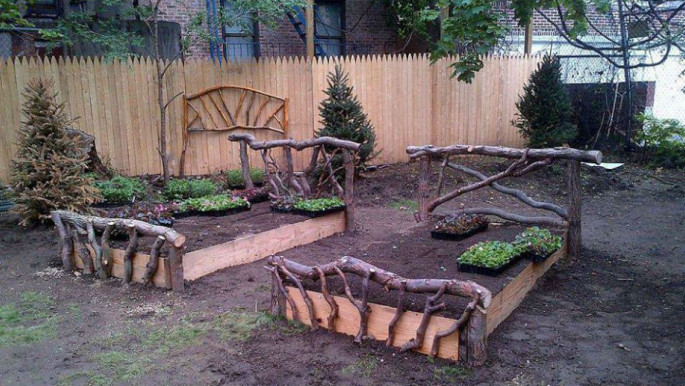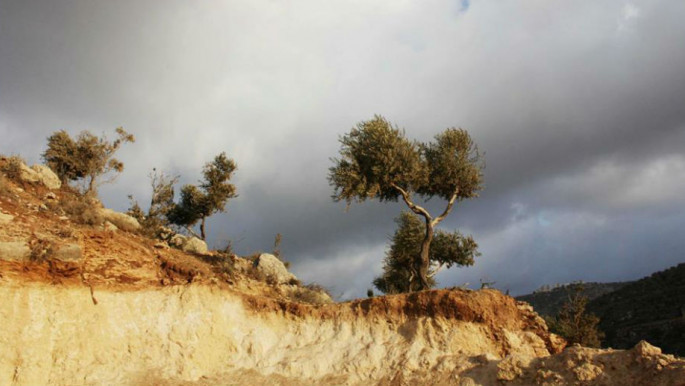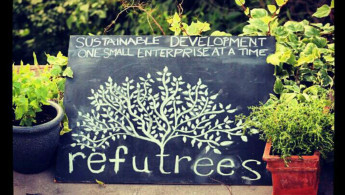Refutrees: Re-sowing Palestine's farming tradition among its refugee population
It's a growing organisation focused on devising ways to help Palestinian refugees become self-reliant, free from dependence on donors and foreign aid, through sustainable projects that will not only give them independence but reconnect them to their land and farming-related activities.
Combining the words "refugees" and "trees", Refutrees pledges to maintain and nurture the bond that Palestinian refugees have with their land and agriculture in an attempt to support second- and third-generation refugees in working with urban agricultural concepts.
Inspired by founder and director Lamya Hussain's academic research, Refutrees grew out of Hussain's fieldwork and interviews she had with Palestinian refugees across camps in the West Bank, Jordan and Lebanon.
In working with long-term displaced communities, Hussain found existing development projects incapable of addressing community-based needs. Combining her passion along with qualifications; a Masters in Environmental Studies and a Graduate Diploma in International Humanitarian Law and Refugee Studies, Hussain set her sights on creating an alternative that recycled dependency.
Hussain's vision was a model aiming to produce practical and applicable solutions to boost community livelihoods through food sovereignty and green, social innovation.
And Refutrees have got their work cut out for them. In just one tale of many from this occupied land, there is a family in Ein Keyna, a village outside Ramallah. The father had used his savings to buy the land in 2013, first and foremost for his young children, who belong to the urban generation of Palestinians that have become systematically alienated from their agricutural roots.
"It is absolutely necessary," he said, "for them to be reconnected to our land, as the foremost way to maintain our history and knowledge." The children, with their father, now know every inch of the soil and every plant that grows there - including olives, grapefruit, tomatoes, cucumber, corn, avocado, squash, lemons, and much more.
But this happiness was short-lived, as he received notice from the Israeli authorities that his land - lying in "Area C" - had been identified as violating land laws, with cultivation too close to Israeli settlements (deemed illegal under international law).
The land had to be cleared of all agriculture and property identifiers, or Israeli troops would destroy anything on the site.
This is just one simple story of the struggle for land and food sovereignty in Palestine, and why something as simple as growing your own food for your children is both empowering and a trial.
 |
|
| Refutrees was inspired by fieldwork inside Palestinian refugee camps and interviews with Palestinian refugees [Refutrees] |
As the seed of the idea germinated, Refutrees received huge support from Hussain's long-time mentor Professor Fahim Quadir and friend Kofi Achampong. Both joined the board of directors and helped create the organisation and registered it as an official entity in Canada.
Hussain admits it was a slow process but gradually she was able to recruit young, like-minded individuals that shared her vision and ideas.
"Today, we have a diverse team of architects, environmentalists, lawyers, engineers and academics that contribute and volunteer time in project design and implementation," she told The New Arab.
To date Refutrees has focused only on Palestinian refugees; with limited capacity it is difficult to access and work in other parts of the world, but Hussain hopes in the future to expand her work to include Iraqi and Syrian refugees.
Refutrees gives preference to refugee women and farmers when possible.
"We understand their specific status and encourage their participation in our projects. But we cannot assume a role of women rights advocacy or empowerment unless we critically embed ourselves within the more traditional fabric of local NGOs," says Hussain, who is also a Women's Entrepreneur Day World Ambassador for the UN
As outsiders, Hussain has to constantly remind herself and the entire Refutrees team that they are limited in their interventions:
"We support and extend energies where we can to stand with women activists and networks but we never duplicate their efforts or compete for resources."
 |
|
| Refutrees works closely with local communities and say they don't compete with them for resources [Refutrees] |
Working closely with refugees and developing Refutrees has been "an incredible journey", says Hussain. She reflects on moments of joy and adversity that shaped "our collective understanding of the people and places we work at".
"For me, refugees are real heroes that are challenging global perceptions of identity, citizenship, borders, and governance. They teach us the most complex and mind-boggling things that push us outside our comfort zones in order to try and comprehend what 'displacement' can do to one person, family or a community."
The most powerful or memorable moment during her long journey with Refutrees includes the many encounters "shaking hands, pats on the back from ordinary people in the communities we work in".
But ultimately Hussain can't single out one particular moment - because every time a project built from scratch between Refutrees and their community partner is completed, a new memorable and happy achievement is created.
These are the moments that Hussain feels are the real motivators for the team to continue working and keep "striving to change the 'greyness' of camps into communities where families grow, children play, youth can hang out and the elderly can watch a new generation foster".
 |
|
| The environmentally friendly organisation carries out a range of projects to empower local communities [Refutrees] |
Refutrees' most recent effort, 'Kale Project Palestine', represents a more special significance to Hussain. It started with great challenges in altering community mindsets around kale, a rough and bitter plant:
"We also had to be careful in how we plant, grow and harvest the crop in the soil, water and climate conditions in the West Bank. Nonetheless, we were successful in producing at least three different varieties of kale and created a small and active kale-lovers community."
The team's next step is to train women farmers to grow kale and link them to smaller local markets. In addition to Refutrees' efforts to uphold organic standards, their trial was successful in creating an awareness of the health and nutritional aspects of kale.
Refutrees is itself growing and will soon launch their Labour for Love series. This will include new projects that will build on their existing experience to address community issues of water, waste, urban-planning and agriculture. Hussain is hoping that Refutrees can challenge traditional development and how it operates in the Middle East.
Between war and policy designed to perpetuate dependency, complex poverty cycles and neo-liberal reforms, the Middle East is extremely vulnerable.
"Refutrees has the potential to grow and alter how communities are designed, planned, and built, in particular refugee communities. We hope that in the next decade we will challenge citizenship and identity politics across borders, and help create opportunities for displaced people to live in communities that are not designed to isolate, and exclude people."



